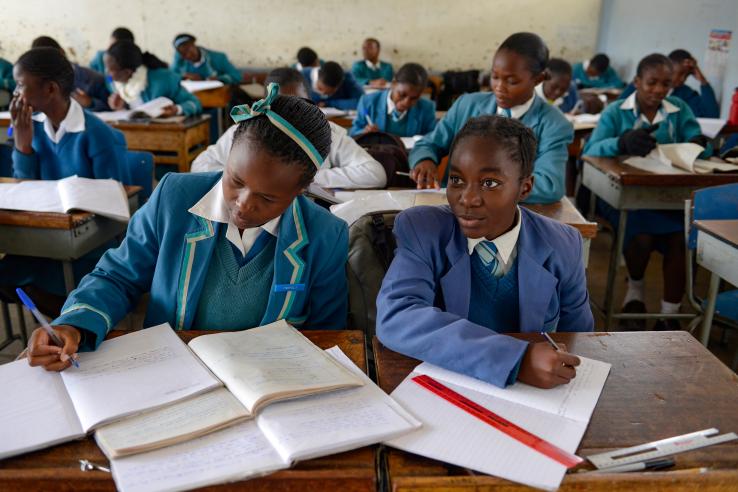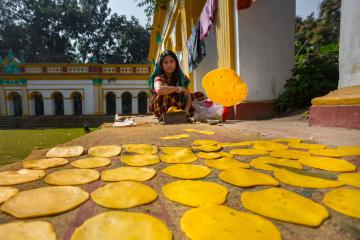
Affiliate Spotlight: Selim Gulesci on entrepreneurship, gender, and the policymaking process

Selim Gulesci is an associate professor of economics at Trinity College Dublin whose research is centered on development economics, labor, and gender. He has recently taken on the role of Scientific Advisor for J-PAL Africa’s Girls’ Education and Empowerment portfolio.
Selim Gulesci’s passion for development economics and gender began with the stories told to him by his mother when he was a child. Raised in rural Turkey, Selim’s mother was one of the few women to study economics in her university and she set her sights on working in finance. However, her father encouraged her to become a primary school teacher, an occupation he felt aligned better with her future childcare responsibilities. His mother’s regrets stayed with Selim: “Why women choose certain things and how social norms or expectations affect that was always in my mind, given her story,” says Selim.
While his interest in these topics was cultivated by his mother’s stories, Selim’s path to development economics was winding. He initially studied engineering, but his career path shifted after he became involved in an NGO in southeast Turkey that worked with women who had been victims of domestic violence. Some of these women were at risk of honor killing, a practice where an individual, typically a girl or woman, is murdered by a relative for being perceived as having brought dishonor upon the family. Selim got to know many of the women and their children by helping out at the NGO’s day care. “I enjoyed it so much that I kept doing this type of volunteer work every summer during my bachelor's, and by the end of it, I realized that engineering was not for me.”
Today, Selim works in the intersection of labor and development economics, with particular focus on entrepreneurship and the role of gender norms in limiting women’s productivity. He has conducted randomized controlled trials on a range of topics including agricultural tenancy contracts, access to childcare, and vocational and soft skills training for young women, across numerous regions from South Asia to sub-Saharan Africa.
While Selim is deeply interested in all of the projects he is working on, a recent program evaluation in Mozambique is among the most memorable. He and his team partnered with the Ministry of Education in Mozambique and a local NGO to provide a curriculum to reduce gender-based violence to girls and boys at the end of their primary education. “This is a time when we see a sharp drop in enrollment rates…and a big rise in this type of violence, so we are trying to understand whether gender-based violence is a reason kids drop out of school,” says Selim.
When Selim visited the Ministry of Education to set up the project with his team, he found himself in a unique situation. “I'm used to the idea that we have to go and convince the policymakers that this is an interesting thing to study, but we didn't need to do that at all,” he says. “The Ministry was already aware that violence in schools is a big issue, especially affecting girls, so they were immediately sold on the idea. It was more a question of deciding what type of intervention to deliver and the best ways to do it.”
As such, ministry staff were involved in helping design a context-appropriate program and evaluation. The messages in the curriculum Selim created were guided by a curriculum that the government had already developed. “They showed us textbooks, but the government was concerned that this curriculum was not being delivered as intended because teachers may perpetuate this type of violence, especially towards girls.” Selim converted that curriculum, which included animated videos and discussions, so it could be delivered by an NGO instead of teachers. Today, the government remains invested in the project and receives regular updates from Selim and his team.
The expertise Selim has honed over his career has enabled him to influence the body of research on topics he is passionate about. He has recently taken on a new role as the Scientific Advisor for J-PAL Africa’s Girls’ Education and Empowerment portfolio. Following the pandemic, the need for solutions to improve girls’ access to education is more urgent than ever. “There's so much to do,” says Selim. “I'm excited that the impetus is there to bring together researchers like myself and to work on these important topics.”
Research in Action: The Effects of Childcare Subsidies on Households in Uganda
The challenge: There are many factors that may limit women’s labor opportunities in low-income households, such as social norms and the structure of the labor market. Often, women are responsible for childcare, household tasks, and are involved in self-employment. How might access to childcare improve labor market outcomes for mothers?
The research: Selim and his research team conducted a randomized evaluation of a subsidized childcare program offered to households in Uganda with children aged three to five years old, to better understand the influence of childcare on income and child development. The mothers in the sample were divided into four groups, receiving either free childcare for one year, an unconditional cash grant equal to the cost of the childcare treatment, both free childcare and the cash grant, or no subsidies (the control group).
The results: In families where both the mother and father were present, the father's labor market outcomes increased, such as his wage employment and earnings. This might be because in Uganda, like in many other places, there's a big gender gap in earnings, especially for wage employment. “Since women are more involved in self-employment than men, the fathers may utilize that additional time to go and obtain more lucrative jobs,” says Selim. However, “that doesn't mean that fathers were doing a lot of child care and that their time is freed.” If the mother was doing childcare and her time is freed, then she can do other things that the father was doing around the household, like fetching wood, which then frees up the father's time for employment.
Read more about Selim’s work in Uganda, along with other related randomized evaluations of childcare interventions from low- and middle-income countries, in our Policy Insight.

